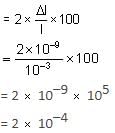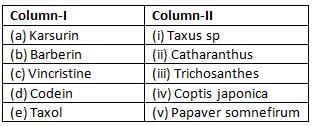GATE Life Sciences Mock Test - 1 - GATE Life Sciences MCQ
30 Questions MCQ Test - GATE Life Sciences Mock Test - 1
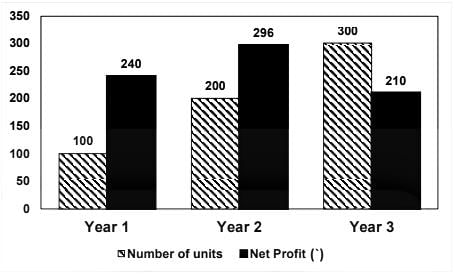
The number of units of a product sold in three different years and the respective net profits are presented in the figure above. The cost/unit in Year 3 was 1, which was half the cost/unit in Year 2. The cost/unit in Year 3 was one-third of the cost/unit in Year 1. Taxes were paid on the selling price at 10%, 13% and 15% respectively for the three years. Net profit is calculated as the difference between the selling price and the sum of cost and taxes paid
in that year.
The ratio of the selling price in Year 2 to the selling price in Year 3 is ________.

The number of units of a product sold in three different years and the respective net profits are presented in the figure above. The cost/unit in Year 3 was 1, which was half the cost/unit in Year 2. The cost/unit in Year 3 was one-third of the cost/unit in Year 1. Taxes were paid on the selling price at 10%, 13% and 15% respectively for the three years. Net profit is calculated as the difference between the selling price and the sum of cost and taxes paid
in that year.
| 1 Crore+ students have signed up on EduRev. Have you? Download the App |
The radial wave function of hydrogen atom for 3s orbital is represented by the relationship __________.
The ground state energy of an electron in a hydrogen atom is –13.60 eV. The energy of the electron in the third excited state is _________eV (rounded off to two decimal places).
A particle is confined to a one – dimensional box of length 1 mm. If the length is changed by 10–9 m, the % change in the ground state energy is
The CORRECT order of acidity of the following compounds is
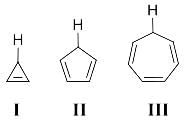
For a reaction, X → Products
Group I contains three plots of reactant concentrations as functions of time, where x = concentration of reactant X at time t; x0 = concentration of reactant X at initial time, t = 0. Group II gives a list of different orders of reaction. Match the plots with the order of the reaction.
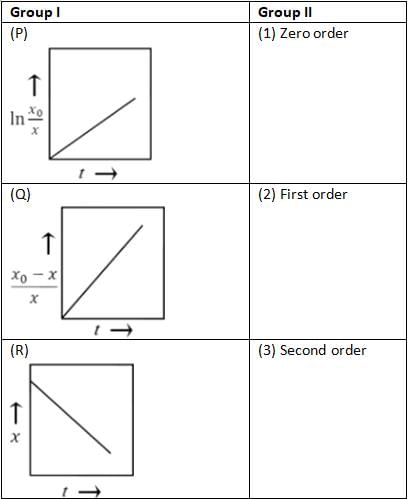
In the given wave function, the number of nodes is
(Give your answer upto 1 digit whole number).
Given the following standard heats of formation, ∆fH⦵(P, g) = 314.6 kJ mol−1, ∆fH⦵(PH3, g) = 5.4 kJ mol−1, and ∆fH⦵(H, g) = 218.0 kJ mol−1, the average bond enthalpy of a P–H bond in PH3(g) is __________ kJ mol−1 (rounded off to one decimal place).
Given the standard reduction potentials,  and
and  the potential of the following cell Ag+ (aq., 1 mM) + Mg(s) ⇌ Ag(s) + Mg2+ (aq., 0.2 M) at 25°C is _______ V (rounded off to two decimal places).
the potential of the following cell Ag+ (aq., 1 mM) + Mg(s) ⇌ Ag(s) + Mg2+ (aq., 0.2 M) at 25°C is _______ V (rounded off to two decimal places).
(Given: Faraday constant = 96500 C mol−1, Gas constant R = 8.314 JK−1mol−1)
Which of the following combinations is true for sporophytic self–incompatibility?
Which of the following statements is incorrect with respect to alternative oxidase activity in cyanide resistant respiration in plants?
In binomial nomenclature, in case of two or more names are given, the oldest, i.e. the name given first is recognised as valid name and all other names are called
Which of the following cellular component(s) is/are NOT part(s) of cytoskeleton in Angiosperms?
In spiral phyllotaxis, leaves are initiated sequentially on the meristem with two successive primordia being separated by golden angle. If a plant follows right-handed spiral phyllotaxis when looked down the meristem, then the angle between two successive leaves would be _________degrees (with correct sign, round off to one decimal place).
9 : 3 : 4 is the dihybrid phenotypic ratio for the genetic interactions of
Match the modified organs in GROUP I with their corresponding prototypic forms in GROUP II and choose the CORRECT option.

According to Hardy Weinberg equation, if allelic frequency for PTC TASTER is 0.2, then what will be the number of non-taster individuals in a population of 1000?
(Give your answer up to 3-digit whole numbers.)
Plant genetics is an extremely immense term. It actually concerns with heredity particularly the mechanism of heredity transmission & differentiations of derived properties among identical or related organisms.One of Mendel's pure pea plant's strains had green peas. How many several types of eggs might such a plant form with respect to the colour of pea?
In a population of a diploid plant species obeying Hardy-Weinberg equilibrium, a locus regulating flower color has two alleles R and r. Individuals with RR, Rr and rr genotypes produce red, pink and white flowers, respectively. If the ratio of red, pink and white flower-producing individuals in the population is 6:3:1, then the frequency of r allele in the population would be __________%. (Round-off to two decimal places.)
A population of snakes in an isolated island is in Hardy–Weinberg equilibrium for a gene with only two alleles (A and a). If the allelic frequency of A is 0.6, then the genetic frequency of Aa is _________ (round off to 2 decimal places).
Which of the following cyclins functions during M phase in cell cycle?
CheA, a protein that participates in bacterial chemotaxis
P. is a histidine kinase
Q. shows autophosphorylation
R. transfers phosphoryl groups to conserved aspartate residues in the CheY
S. is a tyrosine kinase
An enzyme catalyzes the conversion of 30 µM of a substrate to product at reaction velocity of 9.0 µM s-1. When [Et] = 30 nM and Km = 10 µM, Kcat / Km of enzyme will be n × 107 M-1s-1. The value of n is _________ (in integer).





